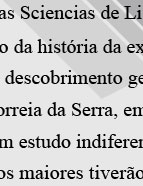

................................
Additionally, the works of Ambassador Eduardo Brazão (published between 1932 and 1980) revealed indispensable sources for studying Portugal’s diplomatic relations in the 17th and 18th centuries, beginning with a presentation of the facts, supplementary information, and by correcting judgements based on unfounded assumptions before embarking on a comprehensive synthesis, which he never completed. Nevertheless, he succeeded in drawing attention to the history of Portuguese diplomacy and foreign policy.
From the late 19th century to the mid-20th century, the dynamics of bilateral relations captured the attention of the Luso-Brazilian Bernardo Teixeira de Morais Leite Velho, who published Estudo histórico das Relações Diplomaticas e Politicas entre a França e Portugal [Historical Study of Diplomatic and Political Relations between France and Portugal](1895), covering the period from the monarchy’s foundation to the fall of Napoleon. Edgar Prestage, an English historian, contributed with a series of works on Portuguese diplomatic history, ranging from biographical monographs such as D. Francisco Manuel de Melo (1914) and Frei Domingos do Rosário (1926) to studies on relations with France, England, Holland (1928) and Sweden (1943), not forgetting the ancient Anglo-Portuguese alliance (1936). The vicissitudes of this longstanding connection were also studied by his fellow Englishman Charles Boxer (1958) and other historians, such as Armando Marques Guedes (1943), Eduardo Brazão (1957), and Caetano Beirão (1942), the latter specifically on the negotiations for the marriage of Catherine of Braganza to Charles II, a subject that also interested Virgínia Rau (1941).
The issue of Portuguese independence and the diplomatic relations of the Restoration attracted the attention of foreign historians. Among others, Alessandro Ademollo (1878) studied the question of Portuguese independence in Rome from 1640 to 1670; Jules Tessier (1877) focused on the mission of the Chevalier de Jant and Franco-Portuguese relations during the time of Mazarin; Henri Lacape (1939) examined France and Portugal's Restoration; and Charles Du Bus (1940) explored the history of Portugal through French manuscripts. Additionally, the Congress of the Portuguese World, held from 1 July to 30 November 1940, in close connection with the dual centennial celebrations (1140/1640) and the Exhibition of the Portuguese World, brought together scholars from various countries in Portugal. Despite being closely monitored by the Estado Novo regime, the event allowed for an assessment of the state of the art and the internationalisation of the national scientific community.
